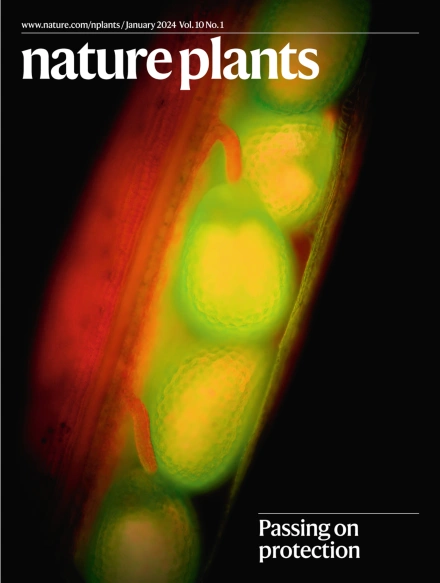II类驱动蛋白-12通过在膈原体中运输细胞板材料促进细胞板的形成
IF 15.8
1区 生物学
Q1 PLANT SCIENCES
引用次数: 0
摘要
植物中细胞板的形成是一个复杂的过程,由高尔基衍生囊泡和含有细胞板成分的内体囊泡定向递送到膜质体中间区。长期以来,人们一直假设小泡是由运动蛋白沿着膜质体微管定向运输的。然而,控制膜质体中间区囊泡积聚和固定的机制仍然是难以捉摸的,并且负责的运动蛋白尚未确定。在这里,我们发现植物特异性的II类激酶-12(激酶-12 -II)作为一种马达蛋白,在苔藓壶菌中驱动囊泡向膜质体中间区运输。在kinesin12-II突变体中,细胞板物质向中间区定向运动及其保留被取消,导致细胞板形成和片质体解体延迟。由kinesin12-II破坏引起的宏观表型是配子体发育的障碍。我们发现这种缺陷是由于在配子体早期产生非整倍体和多倍体细胞,染色体错误分离和细胞质分裂失败发生。这些发现表明,植物动力蛋白-12已经进化获得了一种独特而关键的功能,在膜质体存在的情况下促进了细胞板的形成。本文章由计算机程序翻译,如有差异,请以英文原文为准。


Class II kinesin-12 facilitates cell plate formation by transporting cell plate materials in the phragmoplast
Cell plate formation in plants is a complex process orchestrated by the targeted delivery of Golgi-derived and endosomal vesicles containing cell plate components to the phragmoplast midzone. It has long been hypothesized that vesicles are directionally transported along phragmoplast microtubules by motor proteins. However, the mechanisms governing the accumulation and immobilization of vesicles at the phragmoplast midzone remain elusive, and the motor protein responsible has yet to be identified. Here we show that the plant-specific class II kinesin-12 (kinesin12-II) functions as a motor protein that drives vesicle transport towards the phragmoplast midzone in the moss Physcomitrium patens. In the kinesin12-II mutant, the directional movement of cell plate materials towards the midzone and their retention were abolished, resulting in delayed cell plate formation and phragmoplast disassembly. A macroscopic phenotype arising from kinesin12-II disruption was the impediment to gametophore development. We showed that this defect was attributable to the production of aneuploid and polyploid cells in the early gametophore, where chromosome missegregation and cytokinesis failure occurred. These findings suggest that plant kinesin-12 has evolved to acquire a unique and critical function that facilitates cell plate formation in the presence of phragmoplasts. Class II kinesin-12 is responsible for transporting vesicles containing cell plate materials along phragmoplast microtubules towards the midzone, facilitating efficient cell plate formation during cytokinesis and enabling sequential cell division during multicellular organ development.
求助全文
通过发布文献求助,成功后即可免费获取论文全文。
去求助
来源期刊

Nature Plants
PLANT SCIENCES-
CiteScore
25.30
自引率
2.20%
发文量
196
期刊介绍:
Nature Plants is an online-only, monthly journal publishing the best research on plants — from their evolution, development, metabolism and environmental interactions to their societal significance.
 求助内容:
求助内容: 应助结果提醒方式:
应助结果提醒方式:


